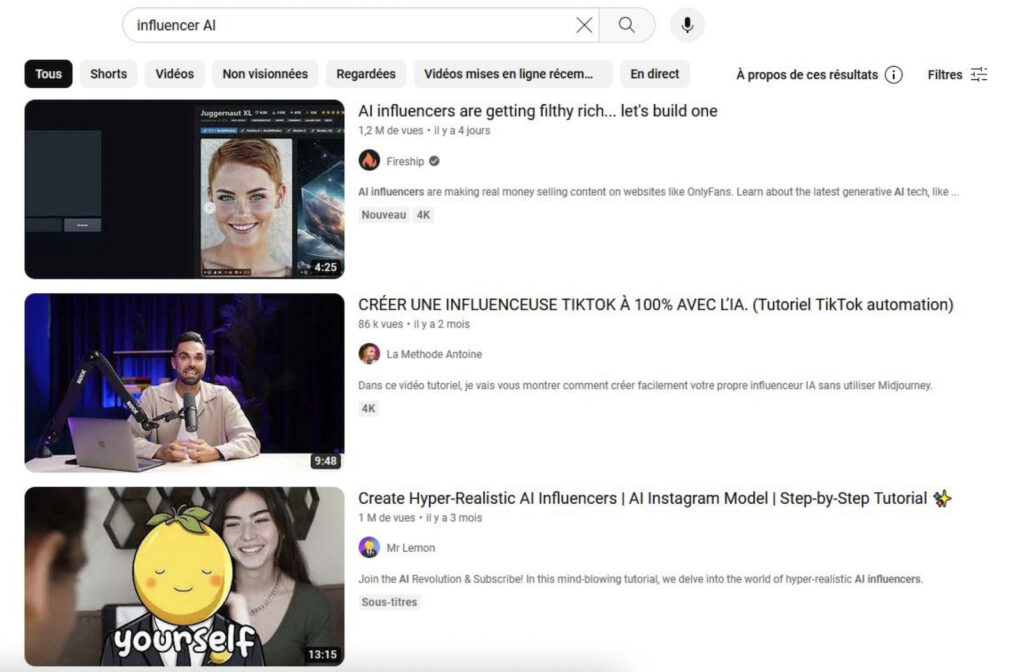What is the real issue behind fake influencers, created from scratch by AI?
This article is taken from the #Règle30 newsletter, which is sent every Wednesday at 11 a.m.
To register for free to receive it, click here.
Life is an eternal beginning. Sometimes I feel like I’m stuck on a hamster wheel. So, when a subscriber (thanks Zenibuka!) told me about a “ influencer artificial intelligence » which interested the media last week, my first reaction was to let out a big sigh. Aitana is the creation of a Spanish company, The Clueless, which itself depends on a communications company. It defines itself on its official website as “ an AI modeling agency » and offers a portfolio « of virtual personalities who reach numerous audiences thanks to their identities, cultures and stories.» Aitana’s Instagram account was launched in June 2023 and already boasts over 200,000 followers. However, its content is quite banal, mainly fake selfies in lingerie or swimsuits. She also posts erotic images on an OnlyFans competitor.
As recalled Release, Well NamedAitana is far from being the first “ AI influencer”, a somewhat pompous title to actually describe a project carried out by real people, who run accounts on social networks using images generated automatically and then modified with classic editing software. We can notably cite her big sister Lil Miquela, who emerged in 2016 and who has long maintained doubts about her real existence.
At the time, it also caused quite a few articles, shared between fascination and panic. Was this the future of online advertising? The end of influence? Would we fall in love with fake women and lose all contact with reality? In the end, none of that happened. And today, with the significant improvement in generative artificial intelligence and its availability to a wide audience, the fashion for virtual influencers seems to be relaunched.

I use the feminine gender on purpose: because Aitana and the other avatars in her wake represent the vast majority of women, in a very reduced vision of femininity (young, fine, available for consumption by men). This is not surprising or new; few months ago, I reminded you, for example, that chatbots are often gendered feminine, because we more easily associate women with the notion of service. But the current phenomenon goes further, with creators who openly admit they want to compete with real women online, or even replace them and their awful flaws.
It’s “easier” to work with virtual influencers, says The Clueless
The employees behind The Clueless say, for example, that the idea of launching a virtual influencer emerged after several disappointments while working with content creators. “ They have egos, manias, or they just want to make a lot of money posing », Complains Rubén Cruz, co-founder of the agency, just before congratulating herself that Aitana can earn up to 10,000 euros in income per month (no way of verifying this assertion).
This quote was widely used in the press, because the Internet loves to hate influencers, or more generally women who put themselves forward. I think about this statement from Magali Berdah during his recent trial against several of his cyberstalkers, motivated by the rapper Booba and his crusade against the world of influence: “ He insinuates that I represent the culture of emptiness, but I prefer to embody that rather than violence. »
The paradox being that the internet also loves looking at women. They are the ones who excite, who are put in advertisements, who decide what is cool or not (I like the theory of the American journalist Ryan Broderick, who supposes that Silicon Valley is jealous of the prescribing power of teenage girls). And this is where, personally, I’m not too worried about the virtual influencer trend. Content published on social networks is always a form of fiction onto which emotions are projected, whether it is the work of a flesh-and-blood woman or an avatar controlled by a startup. It’s probably healthy to remember that it’s all fake. The question is rather who wants to exploit the power of women to communicate online, and for what purpose. We fear influencers, virtual or not, and their lies. But who is really trying to scam you?
Subscribe for free to Artificielles, our newsletter on AI, designed by AIs, verified by Numerama!
